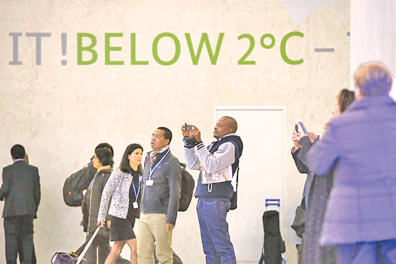Rising temp cost USD 25 billion to SL economy
:
Scorching by 2030
by Rukshana Rizwie
The heat is rising and could cost the Sri Lankan economy USD 25
Billion by 2030.
 |
|
Over 190 countries have
agreed to keep the global mean temperature ‘well below’ a 2°C
increase over what it was before. |
New research suggests that rising temperatures will make it harder
for workers to do their jobs, with the situation growing grim for
semi-skilled workers employed in heat-exposed professions, such as,
farming and construction.
The researchers, led by Tord Kjellstrom of the Health and Environment
International Trust in New Zealand, projected the GDP losses due to heat
stress for 43 countries, using environmental data and computer models.
Their results appear in the Asia-Pacific Journal of Public Health.
320 days of serious heat
Research has found that for Sri Lanka there was a loss of 3.0% of the
Gross Domestic Product (GDP) in 2010 which would go up to 5.9% by 2030.
The total cost of all climate change (CC) impacts will be 7.40% of the
GDP in 2030. The most alarming aspect is that Sri Lanka would have 320
days of serious heat and increase in temperatures, by 2030 in a given
year.
Reduced working hours?
The cost to the country’s economy due to Heat by 2030 is estimated to
be USD 25 000 million, i.e. USD 25 Billion. The report finds that many
of the low- and middle- income countries have estimated annual losses at
multi billion dollar levels. These are tentative estimates, but indicate
the importance of further analysis of climate impact in many countries
struggling to reduce poverty and improve socioeconomic conditions.
The researchers add, the magnitude of these potential economic losses
(billions of dollars in a year) indicates an urgent need to update and
validate these estimates for each country based on the latest climate
modelling, particularly in indoor workplaces. However, since many jobs
cannot be shifted indoors, reduced working hours during the hottest part
of the days will be required. Its included in occupational health
advisories available at national levels and is the basis for the
international standard. This changed work hour distributions can be seen
as part of ‘climate change adaptation,’ but the likely loss of economic
output needs to be considered as an important ‘side-effect’ of this type
of adaptation.
Shifting work schedules to beat the heat and the increasing demand
for air conditioning will however, make people less tolerant to heat
waves, the researchers warned. It will also raise the cost associated
with heat stress. The researchers quoted the city of Bangkok needing an
extra 200 Megawatts for every 1°C rise in temperature.
Staying below 1°C
In 2015, over 190 countries including Sri Lanka agreed to keep the
global mean temperature ‘well below’ a 2°C increase over what it was
before the industrial era, and to ‘pursue efforts’ to keep it even below
1.5°C. However, major countries such as China, have yet to ratify the
agreement. The researchers also called for preventative measures
including the very basic need for sufficient and easy access to drinking
water in all hot workplaces, to replace water loss from sweating. “The
workers and supervisors at hot workplaces also need to learn about
symptoms of severe heat strain and emergency actions to protect workers
at early stages of heat stroke.
These are issues that the local health sector needs to attend to, and
a key task is to communicate risks and prevention options to supervisors
and managers of both large and small workplaces,” they said.
The report also calls on the health sector to be proactively involved
in analyzing the heat exposures, health impacts, and labour productivity
impacts, in order to be able to provide health expertise and evidence
for inter sectoral policies and actions. |

